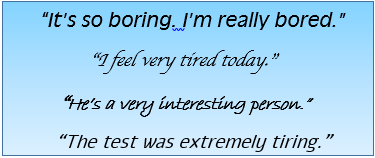In English some adjectives end in -ed (e.g. bored, excited) and some end in -ing (e.g. boring, exciting). Choosing the correct one can be difficult.
-ed adjectives
Adjectives that end in -ed generally show how someone feels about something – their emotions.
I was very bored in the meeting. I just wanted to go home! (I felt bored)
He was excited when he met his favourite singer. (He felt excited)
She was annoyed to find Tom had drunk all the milk. (She felt annoyed)
-ing adjectives
Adjectives that end in -ing generally describe the thing or person that causes an emotion in someone. They show the person’s opinion of that thing or person.
That meeting was so boring! I wanted to go home! (The situation was boring. I was bored.)
I met my favourite singer. It was so exciting! (The situation was exciting. I was excited.)
Who drank the milk? This is so annoying! (The situation was annoying.)
Consider:
He is bored. That man has nothing to do. When I see him I think he feels bored.
He is boring. My opinion of that man. When I speak to him, he makes ME feel bored.
I am confused. I don’t understand what is happening or what someone is talking about.
I am confusing. People don’t understand what I am talking about or what I am doing.
These are some common adjectives that can have both an -ed and an -ing form.
annoyed annoying bored boring
confused confusing disappointed disappointing
excited exciting frightened frightening
interested interesting surprised surprising
tired tiring worried worrying
Practice:
ラボール英会話教室.png)

